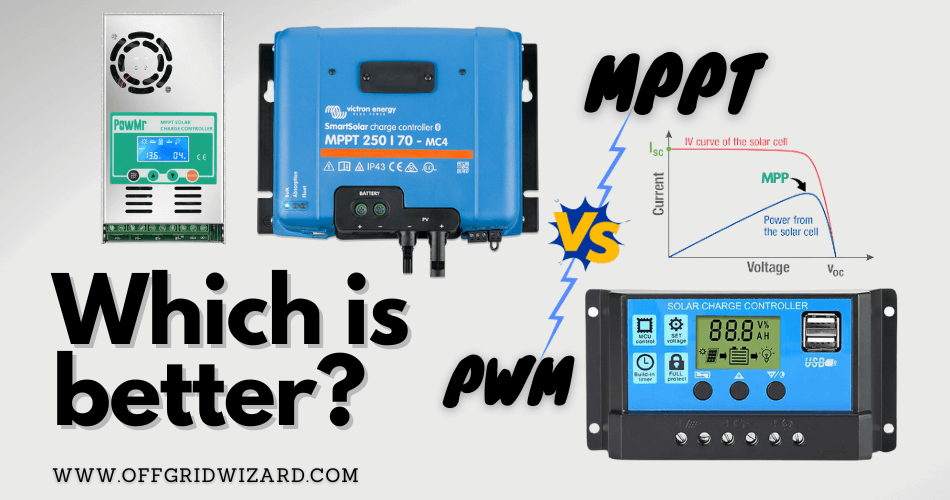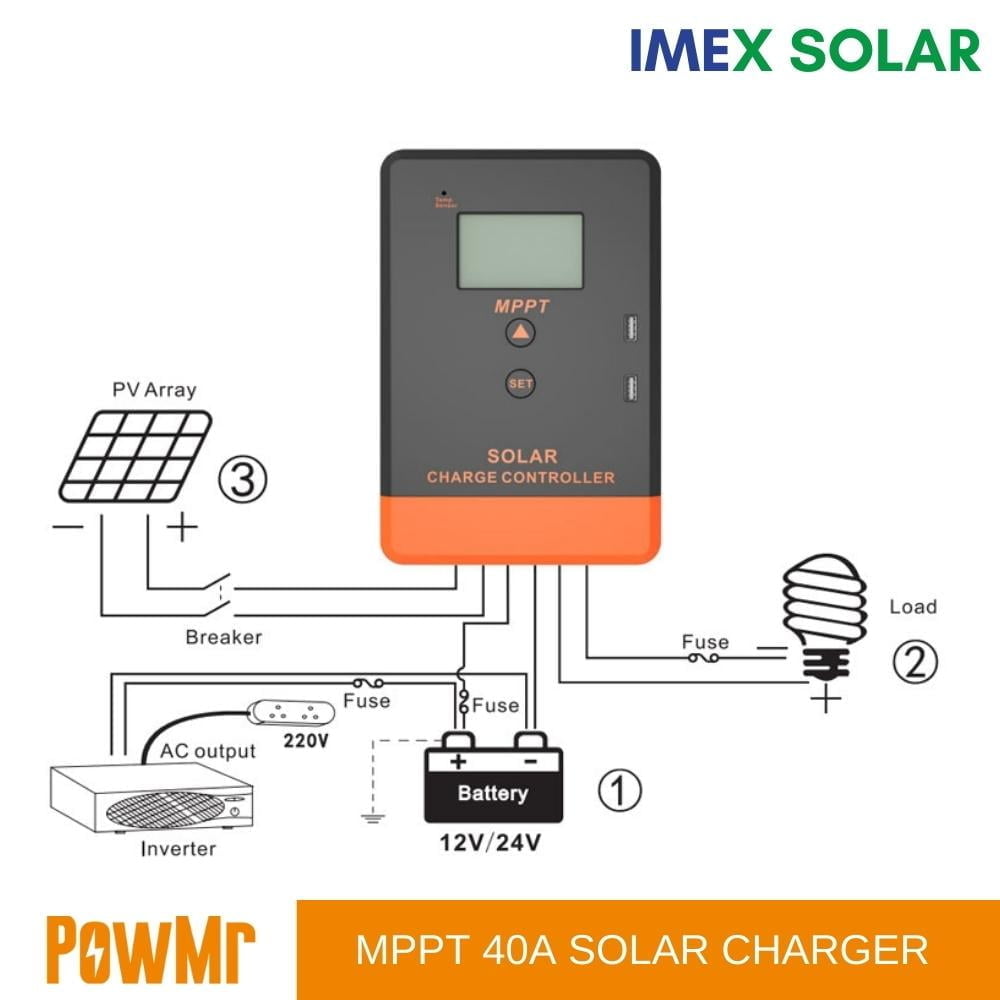Simple Info About Which Is Better Solar Charge Controller Or MPPT

MPPT VS PWM Solar Charge Controllers Which Is Better?
Decoding Solar Charge Controllers
1. What's the Deal with Solar Charge Controllers?
Alright, let's dive into the world of solar charge controllers. If you're venturing into solar power, you'll quickly discover these little gadgets are essential. Think of them as the guardians of your batteries, ensuring they don't overcharge and explode (okay, maybe not explode, but definitely get damaged!). They regulate the voltage coming from your solar panels before it hits your batteries. So, what's the buzz about choosing the right one?
There are primarily two types you'll encounter: PWM (Pulse Width Modulation) and MPPT (Maximum Power Point Tracking). PWM controllers are like the reliable, old-school friend who's always there. They're simple, cost-effective, and do a decent job. MPPT controllers, on the other hand, are the tech-savvy cousins. They're more complex, pricier, but promise to squeeze every last drop of power from your solar panels. Which leads us to the million-dollar question...
The main function of these devices is to protect your batteries from overcharging. Overcharging can lead to overheating, reduced lifespan, and in extreme cases, battery failure. So, a reliable charge controller is essential for any solar power system.
Beyond protection, charge controllers also perform other crucial functions like preventing reverse current flow at night (when the solar panels aren't producing power) and optimizing the charging process for different battery types. Proper charge control contributes significantly to the longevity and efficiency of your solar power setup.

PWM Vs MPPT Charge Controllers What's The Difference? Footprint Hero
PWM
2. The Simplicity and Affordability of PWM
PWM controllers are like the dependable sedan of the solar world. They're not flashy, but they get you where you need to go without breaking the bank. Essentially, they connect the solar panel directly to the battery, but they rapidly switch this connection on and off hence the "Pulse Width Modulation." This rapid switching controls the charging current and prevents overcharging.
Their simplicity makes them quite affordable. If you're on a tight budget or have a small solar setup, a PWM controller might be just what you need. They work best when the voltage of your solar panel closely matches the voltage of your battery. Think 12V panel for a 12V battery. Easy peasy.
PWM charge controllers are effective and reliable in consistent conditions. They are the go to choice for smaller solar panel setups and those operating within limited financial considerations. They are also very robust in terms of environmental variables.
However, PWM controllers have their limitations. They don't perform well in situations where the solar panel voltage is significantly higher than the battery voltage. In these scenarios, a lot of the solar panel's potential power is simply wasted. This is where MPPT controllers step in.

The Difference Between PWM & MPPT Solar Charge ControllerGarnde
MPPT
3. Unleashing the Full Potential with MPPT
Now, let's talk MPPT. These controllers are like the high-performance sports car of the solar world. They use a more sophisticated algorithm to constantly track the maximum power point of your solar panel — the point at which it's producing the most power. They then convert that power to the voltage that's best for charging your battery. It's like magic, but it's just clever electronics.
The beauty of MPPT controllers is their ability to handle a wider range of solar panel voltages. You can use higher voltage panels (which are often cheaper and more efficient) and still get the optimal charging voltage for your battery. They can also boost the charging current, especially in cooler weather.
MPPT controllers are more efficient than PWM controllers, especially when there's a significant difference between the solar panel voltage and the battery voltage. This efficiency can translate into more power for your appliances or a faster charging time for your batteries.
However, this increased performance comes at a cost. MPPT controllers are generally more expensive than PWM controllers. They're also more complex, which means there's potentially more that could go wrong. But if you're serious about getting the most out of your solar setup, an MPPT controller is often worth the investment.

MPPT XtraN Marine Solar Panel Charge Controller
MPPT vs. PWM
4. Choosing the Right Champion for Your Needs
So, who wins in the battle of MPPT vs. PWM? Well, it depends on your specific needs and circumstances. If you have a small system with matching panel and battery voltages, and you're on a tight budget, a PWM controller will probably do just fine. It's the simple, cost-effective solution.
However, if you have a larger system, or you want to use higher voltage panels, or you simply want to maximize your power output, an MPPT controller is the way to go. It's the more efficient, more flexible, but also more expensive option. Think of it as investing in the future of your solar power setup.
One more consideration is the climate you live in. MPPT controllers tend to perform better in colder climates. This is because the voltage of solar panels increases in cold weather, and MPPT controllers are better equipped to handle this higher voltage and convert it into usable power.
Ultimately, the best choice depends on your individual needs, budget, and goals. Do your research, compare prices, and consider the long-term benefits of each type of controller. And remember, a well-chosen charge controller is a crucial component of a happy and healthy solar power system.

MPPT Solar Charge Controller What Is It And How Does It, 44 OFF
Making the Smart Choice for Your Solar Setup
5. Factors to Ponder Before You Plunge
Before you make your final decision, consider a few more factors. Think about the size of your solar array. Larger arrays generally benefit more from the increased efficiency of MPPT controllers. Also, consider the type of batteries you're using. Some battery types are more sensitive to overcharging than others, making a precise MPPT controller even more valuable.
Don't forget about the wiring and other components in your system. Make sure everything is properly sized and compatible with your chosen charge controller. Consult with a solar professional if you're unsure about any aspect of your system design. They can provide valuable guidance and help you avoid costly mistakes.
Look at future expansion plans. If you plan on adding more solar panels to your system in the future, an MPPT controller might be a better investment. It will give you more flexibility in terms of panel selection and allow you to maximize the output of your expanded system.
It is also prudent to read the customer review of which specific brand of solar charge controller you are considering. Reading customer testimonials can provide valuable insight into the reliability, performance, and usability of different models.
